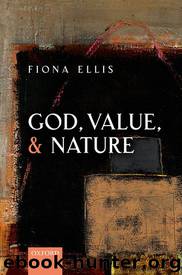God, Value, and Nature by Fiona Ellis

Author:Fiona Ellis
Language: eng
Format: epub
Published: 2016-02-29T16:00:00+00:00
5.6 Conclusion
We are returned to Rahner’s conception of God as the ultimate measure which cannot be measured and a conception of His otherness which promises to transcend the dualistic terms at issue when He is located in an inaccessible realm. It is implied that we are no longer cut loose from God, but that we can relate to Him—and appreciate His radical otherness—only by moving beyond the naturalistic framework which is an inevitable by-product of this dualism. This framework is in place when we see God as the product of a problematic inference from the materials which are available to us at the level of (non God-involving) nature. It is operative also when we are compelled to move in an atheistic direction on the seemingly indisputable ground that the natural world contains no traces of the divine, and can, in any case, be (p.114) explained without this unnecessary theistic shuffle. In one important sense these conclusions are exactly right, for God is not a part of nature, and there is a sense in which nature can be understood as a self-sustaining whole. As we have seen, however, the idea that God is not a part of nature does nothing to undermine the thought that He is its source. Nor does it rule out the possibility that these terms are intimately connected. Likewise, the idea that nature is a self-sustaining whole is compatible with the idea that it has a theistic source, although we must be wary of conceiving of this source as a separable something else lest we revert to the kind of pantheism with which Rahner takes issue.
Expansive naturalism poses a challenge to the idea that pantheism is bound to assume a crude scientistic form.45To be sure, it is not a pantheism which involves seeing God in all things, but it does involve seeing nature as evaluatively enchanted—a nature which can move us to engagement with it on its terms rather than simply on ours.46 So the expansive naturalist gives due weight to the moral, and provides a challenge to the assumption that values must be comprehended scientifically on pain of being intolerably odd. In this respect the offending dualistic framework is dislodged at the level of value, but it reasserts itself in a theistic context with the claim that God could only ever be a spooky something else. I have suggested already that we must take seriously the possibility of taking the expansive exercise in a theistic direction.
Where does this leave the relation between evaluative enchantment and divine enchantment? We know already that, for the scientific naturalist, these modes of enchantment form a joint package in the sense that they stand in equal need of rejection, and can be rejected whilst leaving everything else in its place. At least, this is so on the assumption that evaluative enchantment is comprehended in the required non-scientific terms. However, there need be no implication that they are connected in any deeper sense, for the point could simply be that the relevant (p.
Download
This site does not store any files on its server. We only index and link to content provided by other sites. Please contact the content providers to delete copyright contents if any and email us, we'll remove relevant links or contents immediately.
The remains of the day by Kazuo Ishiguro(8965)
Tools of Titans by Timothy Ferriss(8360)
Giovanni's Room by James Baldwin(7315)
The Black Swan by Nassim Nicholas Taleb(7097)
Inner Engineering: A Yogi's Guide to Joy by Sadhguru(6783)
The Way of Zen by Alan W. Watts(6590)
Asking the Right Questions: A Guide to Critical Thinking by M. Neil Browne & Stuart M. Keeley(5751)
The Power of Now: A Guide to Spiritual Enlightenment by Eckhart Tolle(5742)
The Six Wives Of Henry VIII (WOMEN IN HISTORY) by Fraser Antonia(5493)
Astrophysics for People in a Hurry by Neil DeGrasse Tyson(5172)
Housekeeping by Marilynne Robinson(4433)
12 Rules for Life by Jordan B. Peterson(4298)
Double Down (Diary of a Wimpy Kid Book 11) by Jeff Kinney(4257)
The Ethical Slut by Janet W. Hardy(4236)
Skin in the Game by Nassim Nicholas Taleb(4232)
Ikigai by Héctor García & Francesc Miralles(4229)
The Art of Happiness by The Dalai Lama(4120)
Skin in the Game: Hidden Asymmetries in Daily Life by Nassim Nicholas Taleb(3986)
Walking by Henry David Thoreau(3949)
